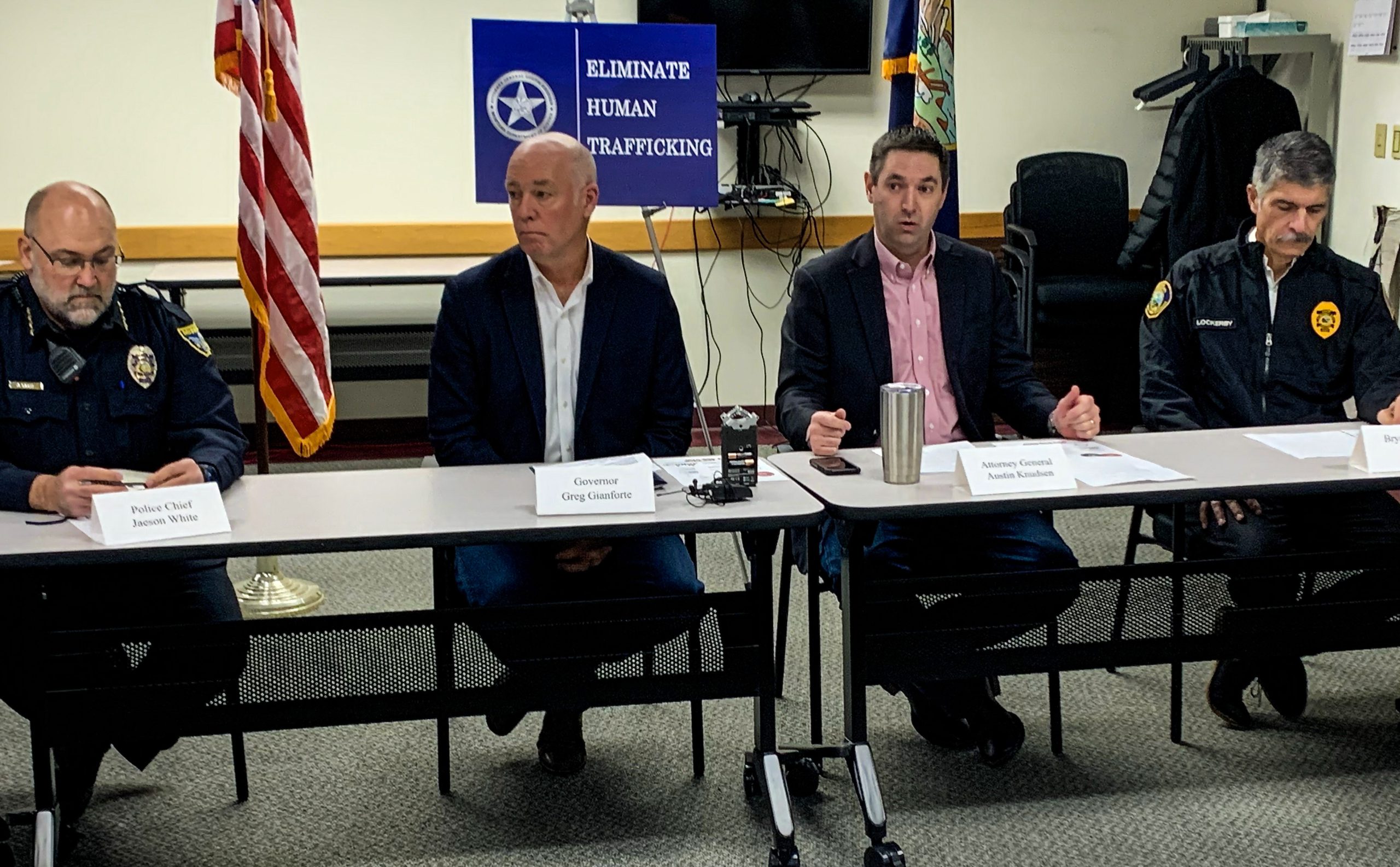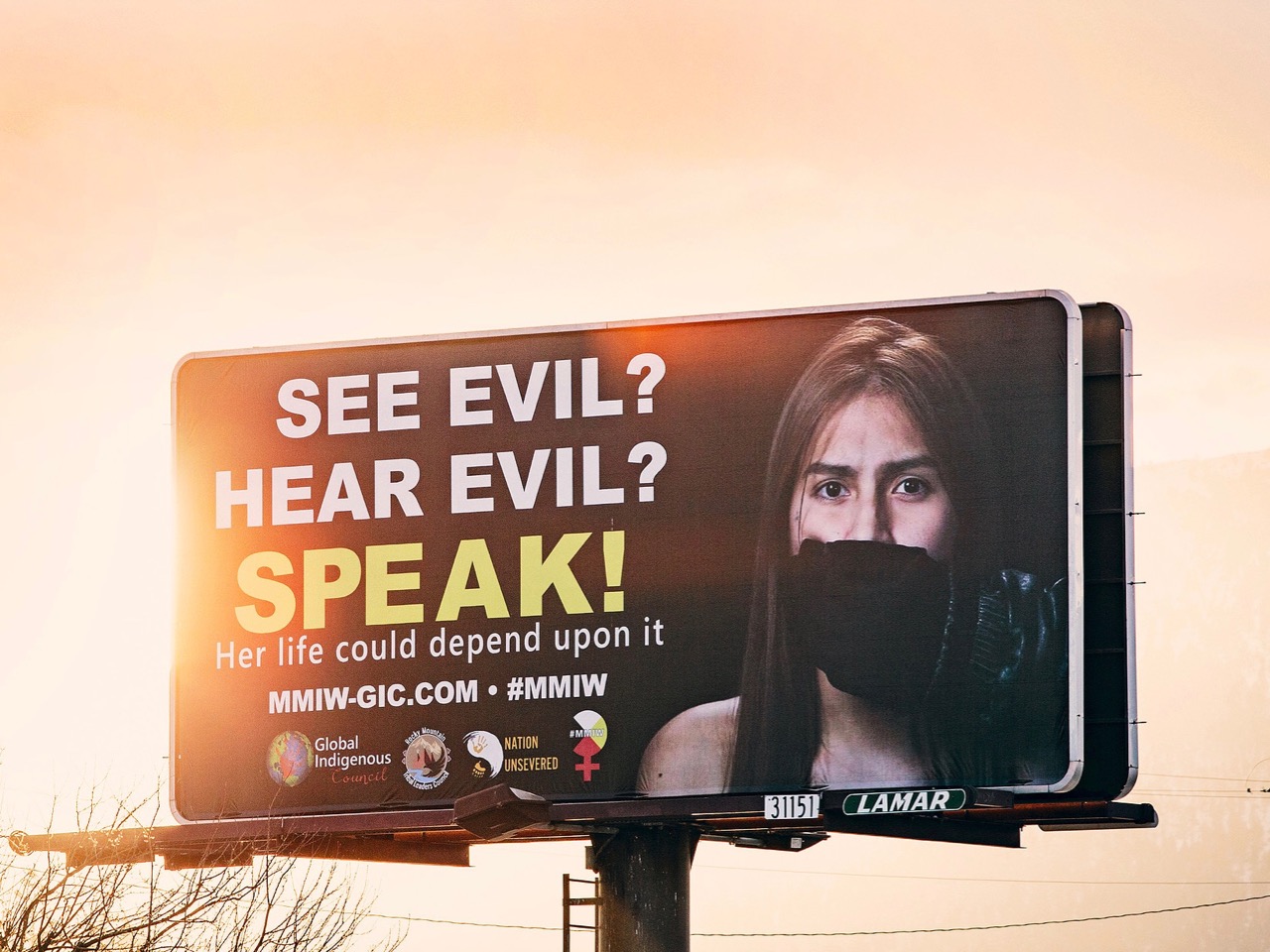Indianz.Com > News > Montana Free Press: Tribes missing from state’s discussion on trafficking

Governor and attorney general host roundtable on human trafficking
Officials discussed ways to improve state and local law enforcement responses.
Friday, January 21, 2022
Montana Free Press
MISSOULA, Montana — Gov. Greg Gianforte and Attorney General Austin Knudsen last Tuesday hosted a roundtable discussion about how to improve Montana’s handling of human trafficking cases, a topic the two officials said is critical following a year of investigations by the state Department of Justice.
The event took place at the State Crime Lab in Missoula and focused predominantly on how law enforcement can better identify and intervene in cases where people are being exploited for sex and labor.
“Everyone likes to think that human trafficking and sex slavery don’t happen in Montana because that’s a big city problem,” Knudsen said during opening remarks. “And that’s just sadly not the case.”
One person at the roundtable meeting, Shantell Gaynor with the Missoula County Justice Department, brought up several points about the need to address human trafficking from economic and public health angles as well as from the law enforcement perspective. Gaynor, reached later by phone, said she does not take the governor and attorney general’s attention to the issue for granted. But she stressed the importance of seeking upstream solutions to help protect vulnerable individuals and communities from exploitation in the first place — including affordable housing, better wage opportunities and education. Many Montanans might fall into trafficking because “that’s how they’re surviving,” Gaynor said. “They’ve got housing and they’ve got food” from the profiteer, she said. A victim “might not love what’s happening, but their very important needs might be met.” The question policy officials should be asking, Gaynor continued, is “how do we create stable environments where people have the best shot at getting their needs met in healthy ways?”Eliminating human trafficking in Montana requires action from all of us.
— Governor Greg Gianforte (@GovGianforte) January 11, 2022
To be part of the solution, learn to identify signs of human trafficking at https://t.co/hvZ9gZJk0h.
If you need help or suspect human trafficking activity, call 833-406-STOP. #HumanTraffickingAwarenessDay pic.twitter.com/i48c5RnyY3
Mara Silvers covers Montana’s social welfare, criminal justice and legal systems. She also tracks policy and social issues that affect LGBTQ+ people. Prior to joining Montana Free Press, Mara worked at Slate and WNYC, where she focused on radio and podcasts. She got her start in audio journalism as an intern at Montana Public Radio. Contact Mara at msilvers@montanafreepress.org, 406-465-3386 ext. 3, and follow her on Twitter.
Note: This story originally appeared on Montana Free Press. It is published under a Creative Commons license.
Search
Filed Under
Tags
More Headlines
Montana Free Press: Bill addresses law enforcement on Flathead Reservation
Cronkite News: Republicans in Congress push for health care cuts
Native America Calling: Native Playlist with Morgan Toney, Tanaya Winder and The Reztones
KFF Health News: Medicaid cuts ‘a tremendous hit’ to Indian Country
Arizona Mirror: Trump administration removes Native contributions from Defense website
‘A historic victory’: Spirit Lake Nation reclaims land taken by federal government
Cronkite News: Democratic lawmaker Raúl Grijalva passes on at age of 77
Native America Calling: Native women who made history
Arizona Mirror: Bipartisan bill provides $5.1 billion for tribal water settlement
Cronkite News: Navajo Code Talker blasts removal of content from U.S. military sites as ‘racist’
Native America Calling: Higher education for Native students at a crossroads
Press Release: Senate Committee on Indian Affairs announces Republican majority staff
MSU News: American Indian Council hosts 49th annual powwow
People’s World: Indigenous coalition celebrates release of Leonard Peltier
National Congress of American Indians ‘deeply concerned’ about removal of Native content from U.S. military sites
More Headlines
Cronkite News: Republicans in Congress push for health care cuts
Native America Calling: Native Playlist with Morgan Toney, Tanaya Winder and The Reztones
KFF Health News: Medicaid cuts ‘a tremendous hit’ to Indian Country
Arizona Mirror: Trump administration removes Native contributions from Defense website
‘A historic victory’: Spirit Lake Nation reclaims land taken by federal government
Cronkite News: Democratic lawmaker Raúl Grijalva passes on at age of 77
Native America Calling: Native women who made history
Arizona Mirror: Bipartisan bill provides $5.1 billion for tribal water settlement
Cronkite News: Navajo Code Talker blasts removal of content from U.S. military sites as ‘racist’
Native America Calling: Higher education for Native students at a crossroads
Press Release: Senate Committee on Indian Affairs announces Republican majority staff
MSU News: American Indian Council hosts 49th annual powwow
People’s World: Indigenous coalition celebrates release of Leonard Peltier
National Congress of American Indians ‘deeply concerned’ about removal of Native content from U.S. military sites
More Headlines

